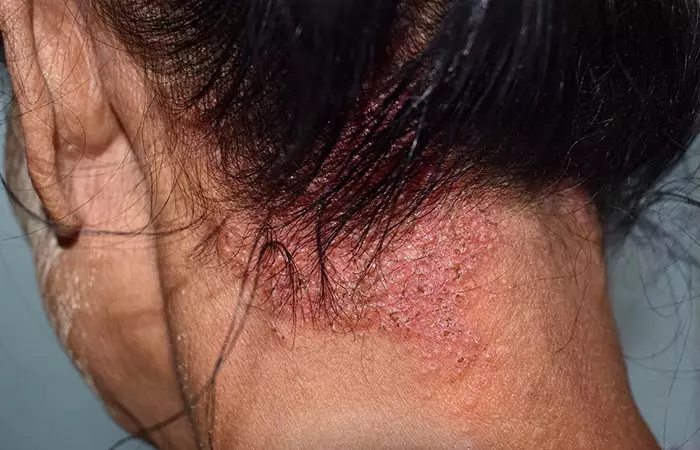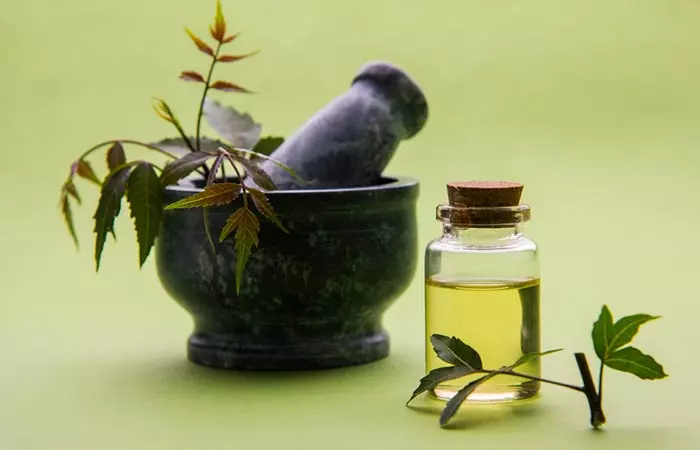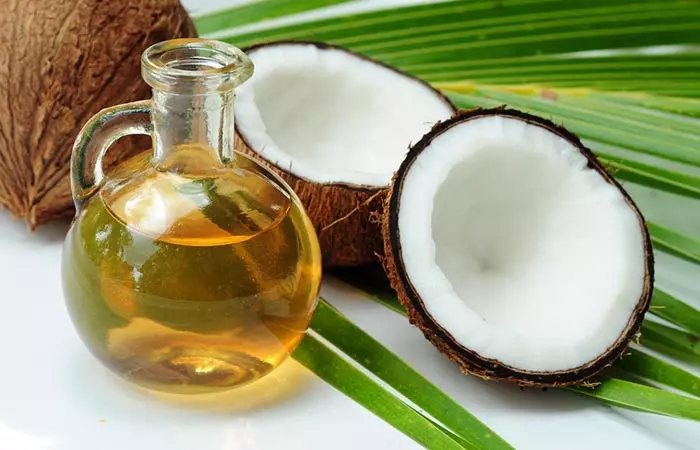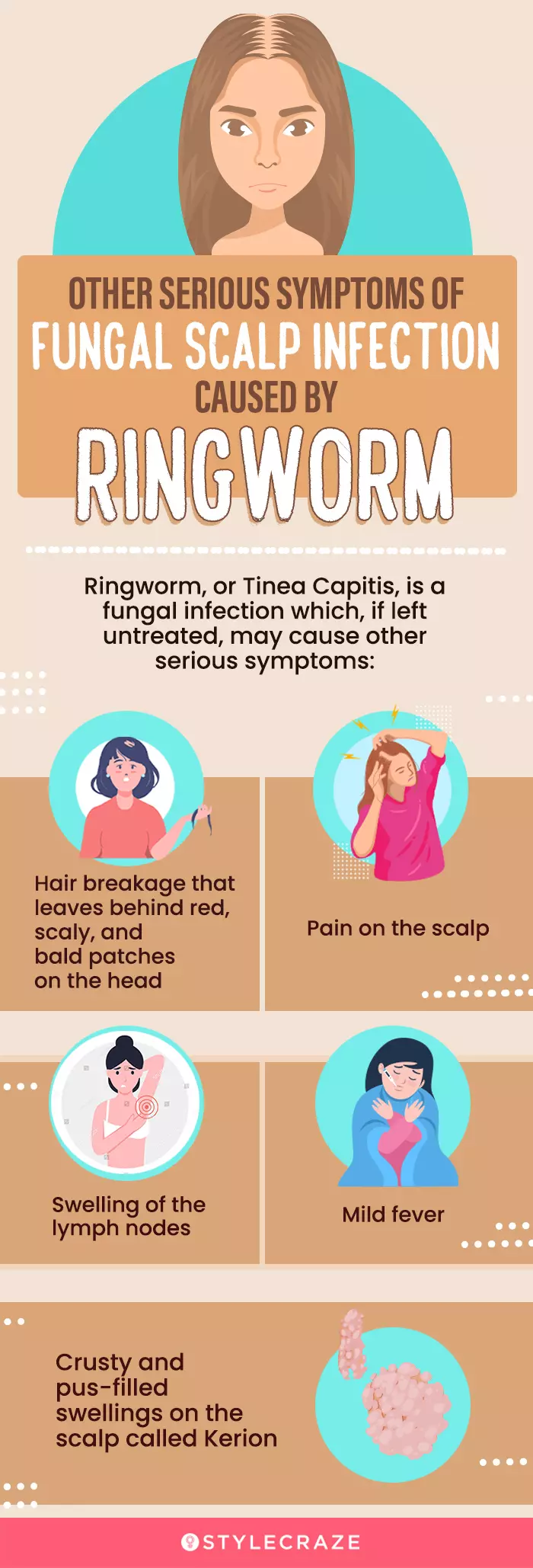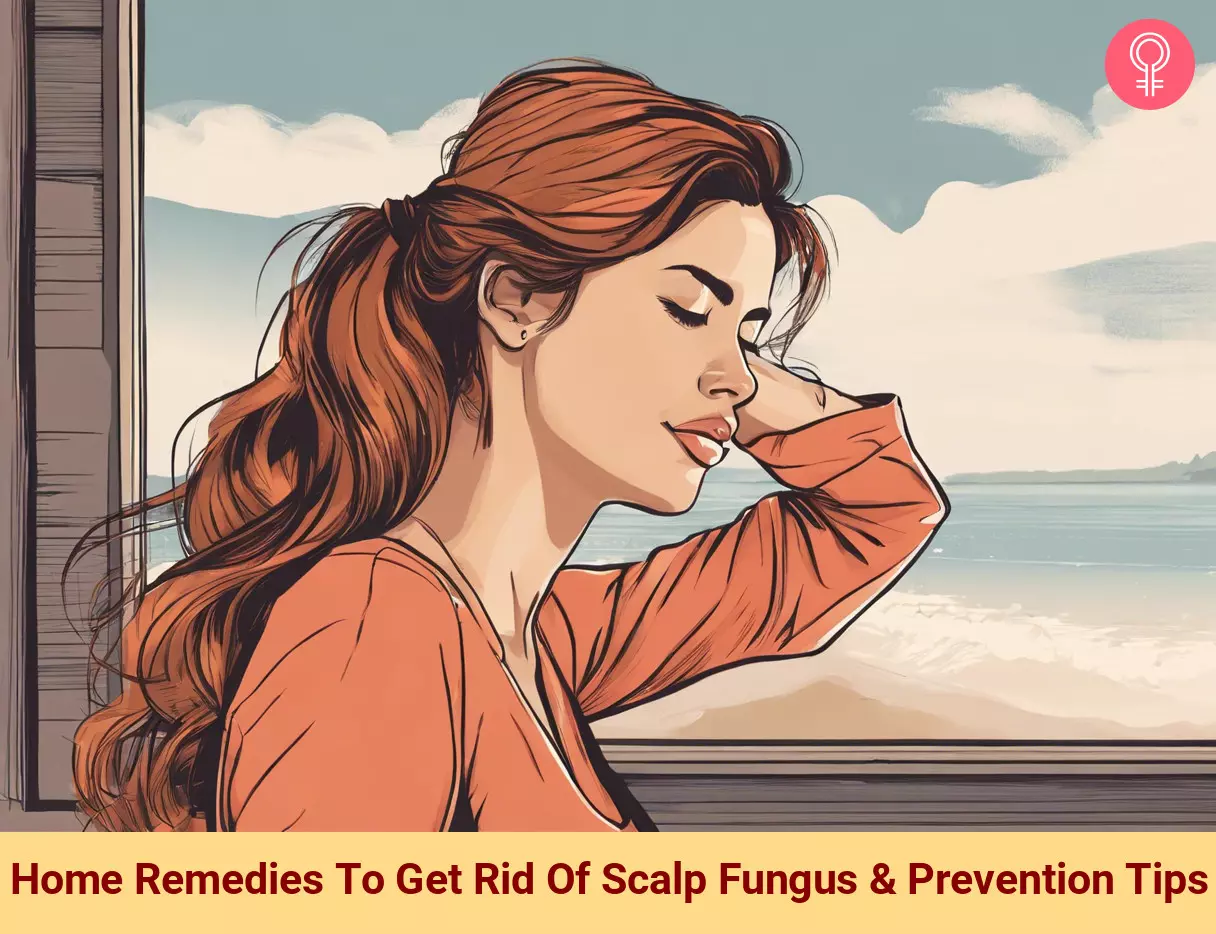Lack of proper hair hygiene, infrequent washing, excess oiling or combing your hair regularly, or using harsh chemicals and dyes on your hair can increase the risk of a fungal scalp infection. Continue reading to learn more about fungal scalp infections and some natural home treatments for the same.
What Is A Fungal Scalp Infection?
A scalp fungus infection, as the term suggests, is a fungal infection on the scalp. Certain types of harmless fungi exist on your skin. When provided with appropriate environmental conditions, these fungi can multiply and cause an infection. Fungal infections can occur anywhere on or inside the body. But they are more common on the feet, fingernails, and scalp. Scalp fungal inflammation weakens the hair and could lead to hair breakage and partial alopecia or hair loss patches. Let’s take a look at the causes.
What Causes A Fungal Infection On The Scalp?
Candida is one of the most common types of fungus known to trigger infections. There are more than 20 species of Candida that have been identified. However, most Candida infections are caused by Candida albicans. More than 1000 people in the US seem to die every year due to candida infection. According to the data, approximately 7,199 deaths have occurred due to this fungal infection in the United States during 2018–2021. Some factors that can contribute to fungal growth on your skin and scalp are:
Certain medical conditions An unhealthy diet Stress Presence of certain harsh chemicals in hair care products Lack of personal hygiene Cuts or injuries on the scalp Sharing towels or hairbrush with people who have fungus in the scalp
How do you know if you have a fungal scalp infection?
Signs And Symptoms
The common signs and symptoms of a fungal scalp infection are:
A reddish or purplish rash on the scalp that may flake White flakes on the scalp that may also shed Pus-filled white or yellow boils on the scalp Soft, moist, and/or white patches on the scalp
These are the common symptoms associated with scalp fungus infection. However, if you are not sure, it is best to consult a healthcare provider for a detailed diagnosis.
Diagnosis Of Scalp Fungal Infections
Your healthcare provider can diagnose a scalp fungus infection in different ways, which may include:
Physical Exam: The doctor examines the scalp for signs of infection and asks about symptoms you have been noticing. Skin Or Hair Sample: A small sample is taken from the scalp and tested in a lab for fungus. Wood’s Lamp: Ultraviolet light is used to check if the fungus glows on the scalp. KOH Test: A scalp scraping is taken from a small area, which is then treated with potassium hydroxide and examined under a microscope for fungus. Culture Test: A sample is grown in a lab to identify the type of fungus.
Once the diagnosis is done, the doctor may plan the treatment according to the type of fungus. Learn about the common types of fungus that may affect your scalp.
Types Of Fungus On Your Scalp
Microsporum
It is a group of fungi that causes tinea capitis, a type of fungal infection of the scalp (1). This fungus can penetrate the sheath of the roots in the hair follicle and get into the hair shaft. Tinea capitis can be inflammatory and non-inflammatory, and may even lead to hair loss.
Malassezia
It is a type of yeast that naturally occurs on the skin, including the scalp. It causes skin issues such as seborrheic dermatitis (also called dandruff when it occurs on the scalp), pityriasis versicolor, and Malassezia folliculitis (2). You can treat it with antifungal and anti-inflammatory medicines recommended by a dermatologist. This fungus also causes dandruff, which can be easily managed with proper treatment and home remedies. If you want to know how to eliminate dandruff, do check our best tips on how to get rid of dandruff naturally.
Trichophyton
It is a common cause of fungal skin infections, including conditions like athlete’s foot, ringworm, and tinea capitis (scalp ringworm). Trichophyton infections typically manifest as itchy, red, and scaly skin rashes (1). Most fungal infections can be treated easily using over-the-counter treatments in the form of shampoos, foams, and ointments. But if you are looking for natural alternatives to treat the infection, the list below may help.
8 Natural Remedies To Get Rid Of A Fungal Scalp Infection
1. Apple Cider Vinegar
Apple cider vinegar has antifungal properties (3). These properties may help in getting rid of the fungi causing the infection. Using apple cider vinegar is easy, as you can mix it with your hair masks or follow this recipe. You Will Need
1 cup of apple cider vinegar (ACV) 2 cups of water
What You Have To Do How Often You Should Do This You can do this 2-3 times a week.
2. Lemon
Lemons are citrus fruits with antimicrobial activities that may help treat a fungal scalp infection (4). You Will Need
1 teaspoon of lemon juice 1 cup of water
What You Have To Do How Often You Should Do This You can do this 2-3 times a week. Caution: Lemon has astringent properties that can dry out your scalp. Therefore, use it in the recommended quantity.
3. Baking Soda
Baking soda, or sodium bicarbonate as it is popularly known, exhibits antifungal activity (5). Hence, it may help in treating scalp fungus. You Will Need
1 tablespoon of baking soda 1 cup of water
What You Have To Do How Often You Should Do This You can do this multiple times a week.
4. Neem Oil
Neem oil exhibits antifungal activity due to the presence of nimonol (6). This can help in dealing with a fungal scalp infection. You Will Need
2 teaspoons of neem oil 1 tablespoon of coconut oil
What You Have To Do How Often You Should Do This You may do this 2-3 times a week.
5. Castor Oil
Castor oil contains ricinoleate, which imparts powerful antifungal properties to it and can help you get rid of the fungi causing the infection (7). You Will Need
1 tablespoon of cold-pressed castor oil 1 tablespoon of coconut oil
What You Have To Do How Often You Should Do This You can do this 1-2 times a week.
6. Tea Tree Essential Oil
Tea tree oil exhibits antifungal actions and has membrane-altering effects on fungi (8). You Will Need
3-4 drops of tea tree oil 1-2 tablespoons of sweet almond oil
What You Have To Do How Often You Should Do This Do this at least twice a week. Caution: Tea tree oil is extremely potent. Hence, use in the recommended quantity and after diluting with a carrier oil.
7. Garlic
Garlic possesses significant inhibitory effects against fungi, which may be effective in treating a fungal scalp infection (9). These properties may help in getting rid of the fungi causing the infection. You Will Need
2-3 cloves of crushed garlic 2 tablespoons of coconut or olive oil
What You Have To Do How Often You Should Do This You may do this 1-2 times a week. Caution: Garlic may burn your scalp if left on for a long period. Do a patch test before using this remedy.
8. Coconut Oil
Coconut oil exhibits excellent antifungal activities and is also one of the best oils for healthy hair growth (10). These properties may help in getting rid of the fungi causing the infection. You Will Need 1-2 tablespoons of coconut oil What You Have To Do How Often You Should Do This Do this at least once a week. Other than these, you can also try onion juice for dandruff, as it is believed to give promising results. These remedies may help get rid of the fungal infection in your scalp. However, if the issue prolongs, it is best to consult your doctor. For more serious infections, a doctor may prescribe antifungal medications or other treatments. These are oral medications and help fight the fungus from the inside. However, you may also have to make a few lifestyle changes to prevent the recurrence of the infection. The following prevention tips may help.
How To Prevent A Fungal Scalp Infection
Bathe regularly and practice healthy hygiene. Keep your scalp dry and clean and avoid sweating. Follow a well-balanced and healthy diet. Limit your intake of starchy and sugary foods. Limit alcohol intake. Do not go overboard with antibiotics and steroids. Allow your scalp to breathe by limiting the use of hats, caps, or scarves. Do not share personal items such as combs and towels. Choose chemical-free hair products.
Alex Kouras, a fitness and lifestyle blogger, shared his personal journey with dandruff in a video. He said, “Removing yeast and grains from my nutrition has helped me cure ninety percent of my dandruff and seborrheic dermatitis with nearly immediate results (i).” This dietary change lead to reduced scalp itchiness, flakes, and redness.
Can candida cause hair loss? Yes, it can cause hair loss. If you are dealing with a fungal scalp infection, your scalp might have accumulated a lot of dead skin cells and flakes. Scratching the affected area frequently or using drying hair products on it can cause some hair loss. What kind of shampoo should you use for hair fungus? Medicated over-the-counter antifungal shampoos can prevent the spread of hair fungus. However, if you are looking for natural alternatives, any of the above remedies will do the trick. Is dandruff a fungus? Dr.K.Harish Kumar, MD, DVL, says that while dandruff itself is not a fungus, it is caused by a naturally-occurring fungus called Malassezia globosa. There are other scalp issues that you might easily confuse for dandruff such as seborrheic dermatitis and cradle cap. However, cradle cap only occurs in infants. Seborrheic dermatitis is a chronic form of dandruff, with redness and itchiness as symptoms. How to differentiate between scalp fungus and other scalp conditions? Scalp fungus often shows up as round, scaly patches, itching, hair loss in those spots, and sometimes redness or swelling. Other scalp conditions, like dandruff or psoriasis, can cause flakes and irritation but usually do not cause hair loss, unless left untreated for a long time, or round patches seen with fungal infections. Since symptoms can be similar, it is important to see a doctor for a proper diagnosis. How to grow your hair back after a scalp fungal infection? Some fungal scalp infections can cause an increase in hair fall. However, after successful treatment, your hair should grow back in 6-12 months. My hair smells when wet. Is this a fungus? If your hair always smells when wet, it is most probably due to the presence of a fungus called mildew. When the hair is left damp and tied for extended periods, it can lead to the development of mildew. Sweating excessively can also cause this fungal growth. Should I completely shave my head to get rid of dandruff? Will it help fight against the fungus problem? No, shaving your hair will not help dandruff. Instead, if your oil and wash your hair more regularly and follow the remedies discussed above religiously, you will notice fungal scalp infections like dandruff disappearing. You can instead try some home remedies for itchy scalp and dandruff. When to see a doctor for a fungal scalp infection? According to Dr. K. Harsish Kumar, MD, DVL, you need to see a doctor immediately if:
The scalp appears unusually colored or scaly. You notice hair loss in patches. The scalp itches and/or bleeds.
What is the difference between ringworm of the scalp and a scalp yeast infection? Both ringworm and yeast infections are fungal growths that can occur on the scalp. While a scalp yeast infection may cause an increase in hair loss due to the accumulating dead skin cells on the scalp, tinea capitis or ringworm of the scalp may result in itchy and scaly round patches in the scalp with some bald spots. Other symptoms of both these fungal infections are almost the same – like a flaky, itchy, or discolored scalp. Is scalp fungus contagious? While scalp yeast fungus caused by Candida is generally not contagious, ringworm fungus is. Hence, people with weakened immunity must practice extra caution. Can scalp infection spread to the brain? Scalp infections can risk causing cerebral abscesses. Hence, they should not be taken lightly. Timely measures are key to avoiding unintended outcomes.
Illustration: Home Remedies To Get Rid Of Scalp Fungus & Prevention Tips
